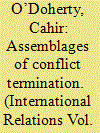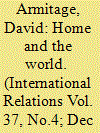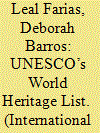| Srl | Item |
| 1 |
ID:
193223


|
|
|
|
|
| Summary/Abstract |
The question of how wars end is of continued importance, especially in the context of the ongoing War on Terror. This question has traditionally been approached within International Relations through rational choice theories, logical modelling and game theory. Such approaches have become increasingly ill-suited to capturing the complexity and ambiguity of contemporary warfare and the War on Terror in particular. These battlefield ambiguities are often at odds with political and public desires to see decisive victory in wars. This article builds on recent critical work within War Termination Studies in order to re-conceptualise the end of war as assemblages. By paying greater attention to the affects inculcated by political rhetoric surrounding war and utilising the concepts of affect and emergence, this article presents a novel approach to the study of contemporary war termination. Utilising popular culture, increasingly seen as a crucial site of global politics, the case study analysed here advances the argument that sacrifice emerges from cinema and presidential rhetoric as a trope that allows leaders to claim victory in war despite indecisive conditions of the ground. Through affective cinematic encounters, conceptualised here through the end of wars assemblages, audiences can become more accepting of such political claims.
|
|
|
|
|
|
|
|
|
|
|
|
|
|
|
|
| 2 |
ID:
193227


|
|
|
|
|
| Summary/Abstract |
The Finnish lawyer-historian Martti Koskenniemi’s new book, To the Uttermost Parts of the Earth: Legal Imagination and International Power, 1300–1870 (2021), is the culmination of a 30-year-long project to deconstruct and historicise the reigning assumptions of the profession of international law. This article evaluates To the Uttermost Parts of the Earth in the context of Koskenniemi’s larger critical project as well as within the historiography of international law from the late 19th century to the present. It argues that Koskenniemi’s genealogical method is revealing and frustrating in equal measure: frustrating in its diffuseness and lack of overarching argument but revealing in its scope, in its erudition and in its ambitions to disrupt traditional teleologies, to reveal the constraining force of legal language and to expose European dialogues between ‘domestic’ and international law over more than 500 years.
|
|
|
|
|
|
|
|
|
|
|
|
|
|
|
|
| 3 |
ID:
193225


|
|
|
|
|
| Summary/Abstract |
When a state is dissatisfied with an international institution it has different strategies available to it to secure change. These strategies are increasingly well understood due to research in the areas of regime complexity and institutional selection. But while there is an understanding of how the structure of a regime can influence the chances of success of different change proposals, there is less clarity on how the content of proposed changes impacts their success. In this article we decompose proposed institutional changes into two sub-types: Status-quo challenging and status-quo enhancing. Status-quo enhancing changes promote reforms that advance the objectives of the existing regime and so serve to drive change that would otherwise be limited by the inertia of existing institutions. Conversely, status-quo challenging changes undermine the stated goals of the existing regime. We develop these sub-types by comparing China’s attempts to secure changes in the global finance and trade regimes and find that for China status-quo enhancing changes have met with more success than status-quo challenging approaches because they have created more opportunities for productive coalition building.
|
|
|
|
|
|
|
|
|
|
|
|
|
|
|
|
| 4 |
ID:
193226


|
|
|
|
|
| Summary/Abstract |
Theories can either have something to say about the future or provide foundations for making judgments about the future. In either case, however, a theory remains inadequate for obtaining insights about the future which no amount of advancements in information access and quality or methodologies can overcome. This article suggests that inadequacy persists and cannot be completely overcome because of the long-term and short-term time perspectives embedded within a theory. Using illustrative examples of time perspectives from Morgenthau’s theory of international politics, this article illustrates and analyses how long-term and short-term time perspectives within a theory delimit claims or judgments about the future made within or derived from a theory. Subsequently, readers gain insights on how to conceptualise long-term and short-term time perspectives, methods for identifying and differentiating between time perspectives within a theory and the distinct work time perspectives perform within a theory when multiple time perspectives are present.
|
|
|
|
|
|
|
|
|
|
|
|
|
|
|
|
| 5 |
ID:
193224


|
|
|
|
|
| Summary/Abstract |
With almost universal membership, the World Heritage Convention is at the heart of the global governance of heritage. Nested within UNESCO, the Convention sets the parameters for determining which natural and/or cultural sites can receive the prestigious ‘World Heritage Property’ designation and be added to the World Heritage List. What started in the early 1970s as an expert-based classification procedure focused on heritage preservation has become an ostensive political process, and a hotbed of competing nations interested in the domestic and international power deriving from inscriptions in the World Heritage List. This paper takes this empirical case as a springboard to reflect upon two key interrelated issues: the politicization of expertise and classification by International Organizations, and heritage as a national identity project and projection of ‘soft power’. In doing so, it highlights how changes in the global system since the late 19th century – for example, colonialism, Cold War, ‘emerging’ powers – affected the global politics of heritage. The paper adds to the incredibly trans-disciplinary field of world heritage research by anchoring itself in International Relations literature, mostly through a Constructivist-based approach.
|
|
|
|
|
|
|
|
|
|
|
|
|
|
|
|